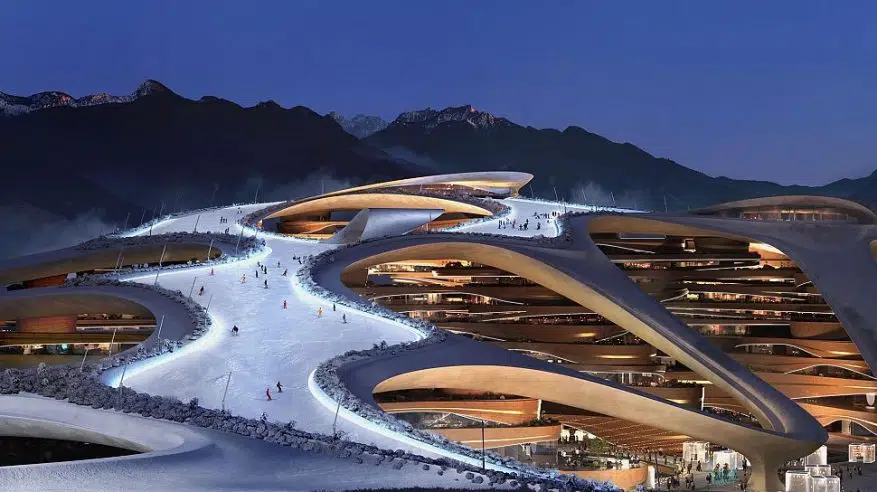Snow-covered mountains, people skiing, and luxury accommodations are some of the images Saudi Arabia wants to imprint in people’s minds about Trojena, one of four major parts, alongside The Line, Oxagon, and Sindalah, of the Crown Prince Mohammed bin Salman’s brainchild: “NEOM”, a $550 billion “giga-project” that aims to show the world Saudi Arabia’s grand ambitions in matters of sustainability.
Although some people might find the idea absurd, the truth is that Saudi Arabia plans to build a ski resort in a mountainous dry area, with little precipitation, where natural snow is rare, though possible in minimal quantities. The fact that the area is 10 degrees cooler on average than the rest of the GCC region explains why this place has been chosen. Nevertheless, most of the snow will still have to be man-made, and that is where the main problem lies: covering 36km of ski slopes with snow requires water, and in an arid country such as Saudi Arabia, this usually entails the utilization of desalination plants, which are powered by fossil fuels. The same can be argued for the man-made freshwater lake, which represents another of the highlights of Trojena. However, Saudi Arabia asserts that the entire Neom’s desalination process will be fueled by renewable energy. The sole inconvenience is that using renewable energy with desalination plants has never been successful. In this scenario, it is clear that the technology to make the eccentric Neom project happen might not exist, but Saudi Arabia will keep relying on a techno-optimistic ideological trend that proclaims that, perhaps someday, technology will resolve humanity’s ecological problems. Until that happens, it is business as usual.
Moreover, bizarre solutions to the climate emergency like Neom, are senseless and not realistic. The challenges climate change poses to the human race require responsible energy solutions, whose complexity simply cannot be overlooked. The negative aspects of Neom also highlight the necessary expansive impact analysis that should accompany every proposed climate change solution, or at least the need for “energy democracy”, in other words, the community’s involvement in decision-making to build systems that focus on local needs and concerns. Contrary to this spirit, the megacity project has already cleared two towns and forcibly displaced an estimated 20,000 members of the Huwaitat tribe from their ancestral homeland. Abdulrahim al-Huwaiti, the face of the tribes’ criticism of the kingdom’s actions, was shot and killed by security forces in 2020, an event that stresses the tension between the tribe and the country’s development plans. As an outspoken activist and member of the tribe said: “For the Huwaitat tribe, Neom is being built on our blood, on our bones”. If the project is not planned with local actors’ interests in mind, who is it created for then? The activist is clear about that: “It’s definitely not for the people already living there! It’s for tourists, people with money”. For the Huwaitat tribe, as well as some Saudis, the project, which is thought to have a parallel legal system reporting to the king directly, represents an attempt to shut them out of the elite version of the Saudi society that Neom would exemplify. As a member of the ALQST Organization for Supporting Human Rights states: “is (…) a vanity project targeting the domestic elite and an international audience in terms of a new Saudi, one that’s open and economically or socially liberal”.
The eco-region is also part of Saudi Arabia’s Vision 2030, a strategy designed to diversify the kingdom’s economy away from oil. The genuine intention behind this objective, however, can be questioned. To this day, Saudi Arabia remains the world’s second-largest oil producer, and its emissions are projected to rise significantly by 2030. Additionally, Saudi’s national oil company, Aramco, plans to increase oil production in the coming years. Moreover, the kingdom’s government is vigorously seeking to undermine global efforts to phase out fossil fuels by promoting false solutions -such as carbon capture and storage (CCS) technologies- and obstructing international climate negotiations. As an example of the latter, during COP 27, Saudi Arabia strongly opposed the use of language related to the phase-out of fossil fuels. Also, concerning the recent COP 28, Saudi Arabia’s energy minister claimed that the resulting agreement to transition away from fossil fuels was just one of several choices a country could make of an “a la carte menu”.
As a matter of fact, despite the kingdom’s repeated announcements of ambitious renewable energy targets, little progress has been made in the last decade to meet them. For instance, a recent target established that the country should generate 50% of its electricity with renewable energy by 2030. Notwithstanding that, in 2022, just 1% of electricity was generated with clean energy. This perfectly explains why the Climate Action Tracker (CAT) defines Saudi Arabia’s overall climate action as “Critically Insufficient” and why the “Mountains of NEOM” and the megacity as a whole, stand as another example of greenwashing, this one straight out of a science-fiction movie. Not only that, but Trojena’s selection as the hosting place of the Asian Winter Games 2029, is in line with the country’s common practice of using sports to divert attention away from its poor human rights record, otherwise called sportswashing.
No matter how hard it tries to show otherwise, Saudi Arabia is on the wrong track on both climate change and human rights issues. A lot more pressure and political will is needed to change this fact.





